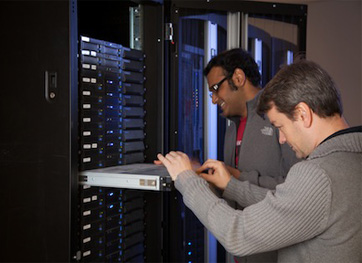
The University of Houston (UH) computer science department is expanding its high-speed
computing capabilities thanks to a computer hardware donation from Total, a leading
multinational energy company. The donation includes 128 interconnected nodes that
will occupy four racks of space.
“This gift from Total will extend our existing computing resources,” said Jaspal Subhlok,
chairman of UH’s department of computer science. “Having more compute resources will
not only allow us to do larger simulations and larger analyses, but also allow multiple
simulations to run simultaneously.”
Industry and research centers use computer clusters of this size to solve problems
that are too large for an individual PC or would take too long to be solved on a single
PC.
“Total is proud to award this donation to the University of Houston, a center of higher
learning whose research programs are an integral part of our community and economy
here in Houston,” said Wafik Beydoun, CEO and president of TOTAL E&P Research & Technology
USA. “We have strong, long-standing research alliances with the university and are
currently partnering on leading-edge geophysical, engineering and high-performance
computing topics.”
“The cluster performs 4.5 trillion compute operations per second,” said Edgar Gabriel,
associate professor of computer science and coordinator of UH’s bid for the Total
donation. “To put that in perspective, think of one compute operation as one addition
or multiplication operation. This cluster can perform 4,500 billion add or multiply
operations in a single second.”
Gabriel says the cluster will impact faculty and doctoral research projects and will
be used by students in various course activities. Researchers in computer science,
physics, and chemical and biomolecular engineering already have expressed an interest
in using the cluster.
“The computer science department also will be doing systems-level research,” Gabriel
said. “We have several projects planned that are addressing improved ways for industry
and research to optimize use of these types of resources.”
Several UH research projects plan to make use of the cluster’s speed and large data
analysis capabilities. The research topics include efforts to create simpler and more
effective programming models for large computers, the simulation of molecular structures,
studies of thermodynamics at the molecular level, and studies of pedestrian and traffic
patterns that require the simultaneous analysis of enormous amounts of surveillance
video data.
Students also will benefit from access to the computer cluster, gaining valuable experience
that will be beneficial in the job market.
“A number of courses require computer science students to learn how to run large projects
on this type of cluster,” Gabriel said. “We also expose the students to the management
side of these resources – setting up a cluster, networking it and understanding the
systems administration of it.”
Total selected UH to receive the cluster donation from a group of several companies
and institutions in the U.S. Criteria for awarding the donation included the ability
to strengthen and sustain a research alliance/collaboration; a background history
of collaboration between Total and the potential recipient; the potential recipient’s
interest and needs for the cluster; and readiness of the recipient to integrate the
cluster within its IT data center facility.
“After thorough evaluation and discussion with the potential recipients, we decided
to make the award to UH, which scored high in all categories under consideration,”
Beydoun said.
The computer science department plans to begin using the cluster this month. The Texas
Learning and Computation Center and the UH Information Technology High Performance
Computing Group will jointly administer the cluster.
###
Editor’s note: Story courtesy of Kathy Major, College of Natural Sciences and Mathematics.
About the University of Houston
The University of Houston is a Carnegie-designated Tier One public research university
recognized by The Princeton Review as one of the nation’s best colleges for undergraduate
education. UH serves the globally competitive Houston and Gulf Coast Region by providing
world-class faculty, experiential learning and strategic industry partnerships. Located
in the nation’s fourth-largest city, UH serves more than 39,500 students in the most
ethnically and culturally diverse region in the country. For more information about
UH, visit the university’s newsroom at http://www.uh.edu/news-events/.
About the College of Natural Sciences and Mathematics
The UH College of Natural Sciences and Mathematics, with 187 ranked faculty and more
than 5,000 students, offers bachelor’s, master’s and doctoral degrees in the natural
sciences, computational sciences and mathematics. Faculty members in the departments
of biology and biochemistry, chemistry, computer science, earth and atmospheric sciences,
mathematics and physics conduct internationally recognized research in collaboration
with industry, Texas Medical Center institutions, NASA and others worldwide.
To receive UH science news via e-mail, sign up for UH-SciNews.
For additional news alerts about UH, follow us on Facebook and Twitter.